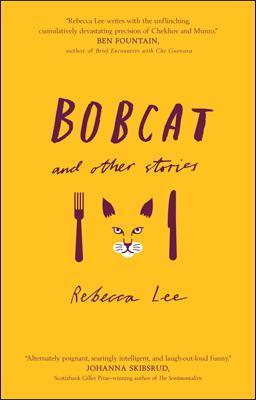A Bobcat With No Bite
A review of Bobcat by Rebecca Lee
I tried with this one, man. I really did.
tried with this one, man. I really did.
Considering that a lot of the reviews I’ve posted over the past year have been especially prickish (not intentionally; I mean, I don’t set out with the intention of disliking a book, it just sort of happens, and this year it has happened a lot), I tried to engage with Rebecca Lee’s Bobcat as much as I could, to understand why critics were so keen on it–why, for example, the NYT’s Robin Romm claimed that “these seven long tales demonstrate Lee’s prodigious talent for creating not just great lines but intricately structured, impressively plotted worlds.” But in the end I determined that I must be much more of a philistine when it comes to literature than I thought, because despite my best efforts, I couldn’t find much praiseworthy about this book.
I will agree with Romm that the prose is lovely–crisp, precise, thoughtful. Lee’s sentences are florid and demonstrate an excellent sense of control and rhythm. Beyond this, however, there’s isn’t much to take away from the book; the stories themselves unravel unceremoniously, the characters all based on the same tired template–white middle-class academics who are good at thinking about stuff, but not much else.
The book opens with the title story “Bobcat,” in which friends gather for a dinner party hosted by a New York lawyer, during which the tenuousness of their relationships–maybe even relationships in general? wink wink!–is exemplified through a number of subtle exchanges that make it clear this is going to be a book about ideas, not necessarily about stuff happening. Which is perfectly fine.
The problem, however, is that from here on out it is the same idea, or iterations of it, over and over again. In six of the seven stories, the main characters are either students or professors at liberal arts universities, facing the kinds of pseudo-dilemmas that only academics–namely tenure-track humanities folks–have the time or energy to care about: a student debates whether or not to present a plagiarized paper at a symposium; members of a disciplinary committee discuss the fate of a radical (translation: only slightly more eccentric than your average NPR listener) econ professor; a young woman discusses the pros and cons of psychotherapy with her Romanian boyfriend. The narrators of each story are more or less interchangeable, as are inexcusably large pieces of plot: roughly half of the major conflicts in this collection, for instance, derive from cultural miscommunications between American narrators and their international counterparts. Problem is, it’s almost always the same miscommunication.
 The bigger problem here, though, of which this might be a symptom, is the author’s obsessive need to constantly remind us of how worldly and well-educated her characters are. Actually, this isn’t really a problem in itself, except that it is done to such a degree that after a while the characters are hardly relatable anymore. Or, for that matter, interesting. Why, for example, would the narrator of the title story always be reminded of a quote from the famous archeologist Ernest Becker at the end of a meal? Or consider this line from “World Party”:
The bigger problem here, though, of which this might be a symptom, is the author’s obsessive need to constantly remind us of how worldly and well-educated her characters are. Actually, this isn’t really a problem in itself, except that it is done to such a degree that after a while the characters are hardly relatable anymore. Or, for that matter, interesting. Why, for example, would the narrator of the title story always be reminded of a quote from the famous archeologist Ernest Becker at the end of a meal? Or consider this line from “World Party”:
“Just the night before, the Nobel Prize had gone to the Bulgarian writer Elias Canetti for his book Crowds and Power, which I happened to have read…but it was a lesser play of his–called Their Days Are Numbered–that I recall when I think back to that day…”
I’m not sure why we need to know that the narrator has read this particular book, especially if it’s not even the focus of the reference. Nonetheless, Lee does this a lot; each story is littered with literary, art, and philosophy allusions, none of which ever illustrate any overarching points or carry us anywhere we need to go in the story but instead serve as reminders that these are some brainy motherfuckers we’re reading about here.
I realize, of course, that’s I’m probably coming across as a bitter philistine here, and that may very well be the case. But I think part of the issue here is that I work in academia, as does Lee herself, and as such I don’t get the sense that what she’s doing in Bobcat requires much vision. On the word level, she comes across as immensely capable, but in terms of plot and structure she seems disinclined to take any risks, to step out of a pretty well-tread comfort zone. This isn’t to say that you can’t write about your profession. Of course you can. Write what you know, as the adage goes. But something needs to happen in whatever it is you’re writing, and that’s just not the case here. Bobcat may aspire to be a book about ideas, but it doesn’t take a literature scholar to know that some ideas are just really, really dull.





